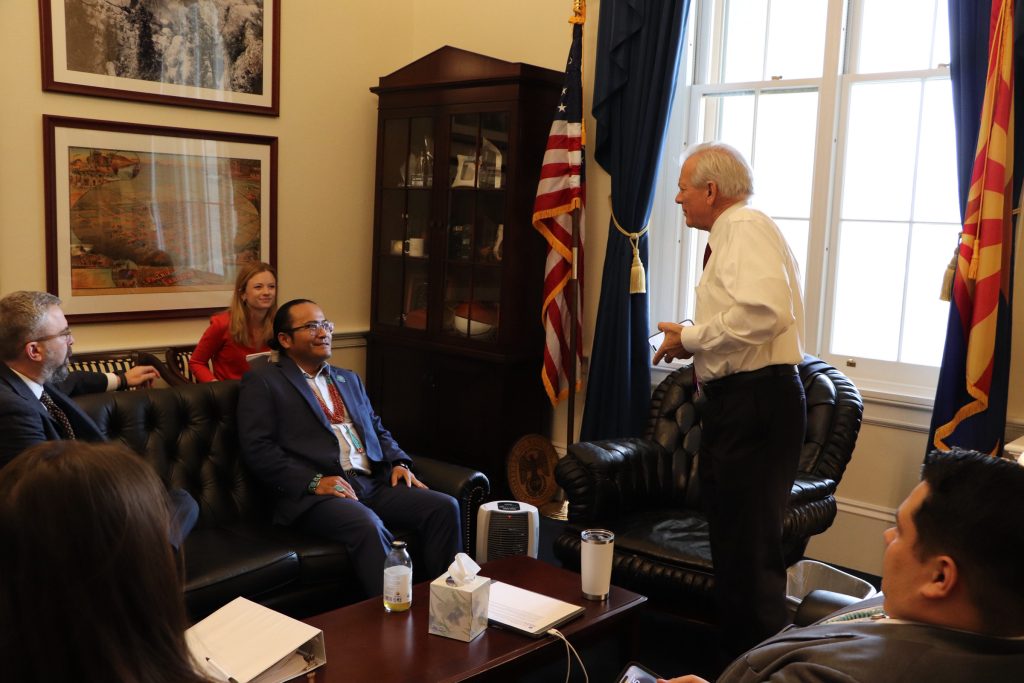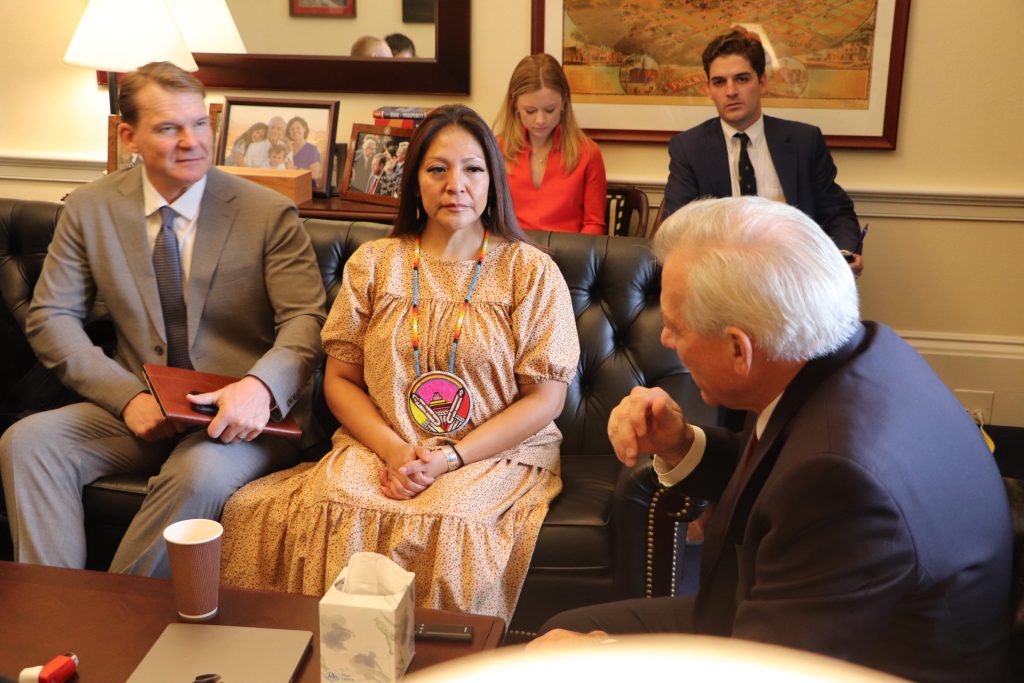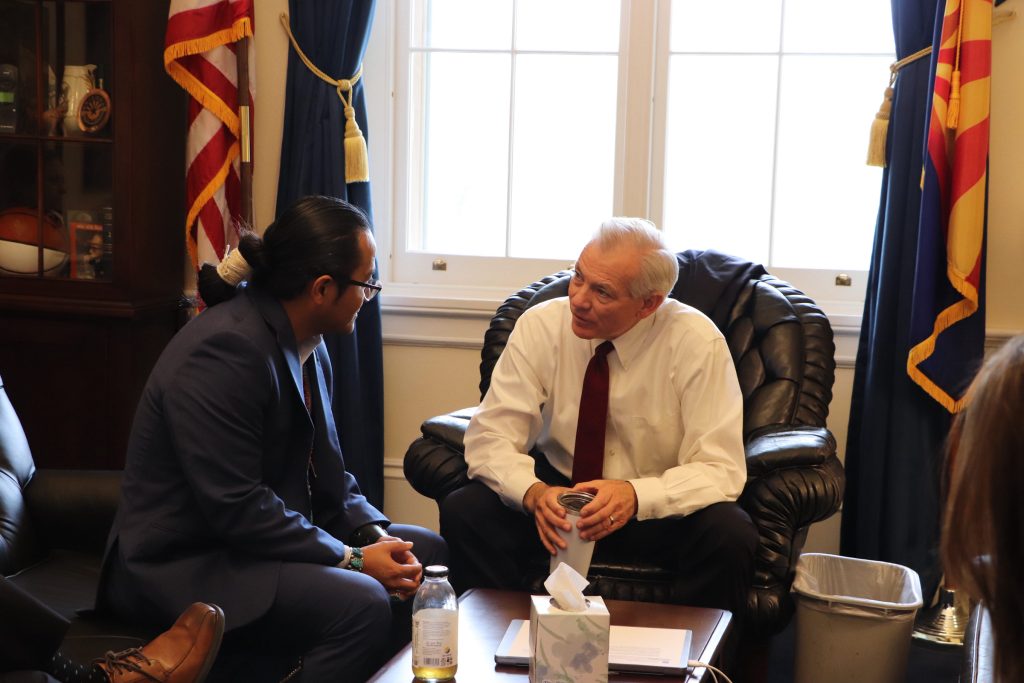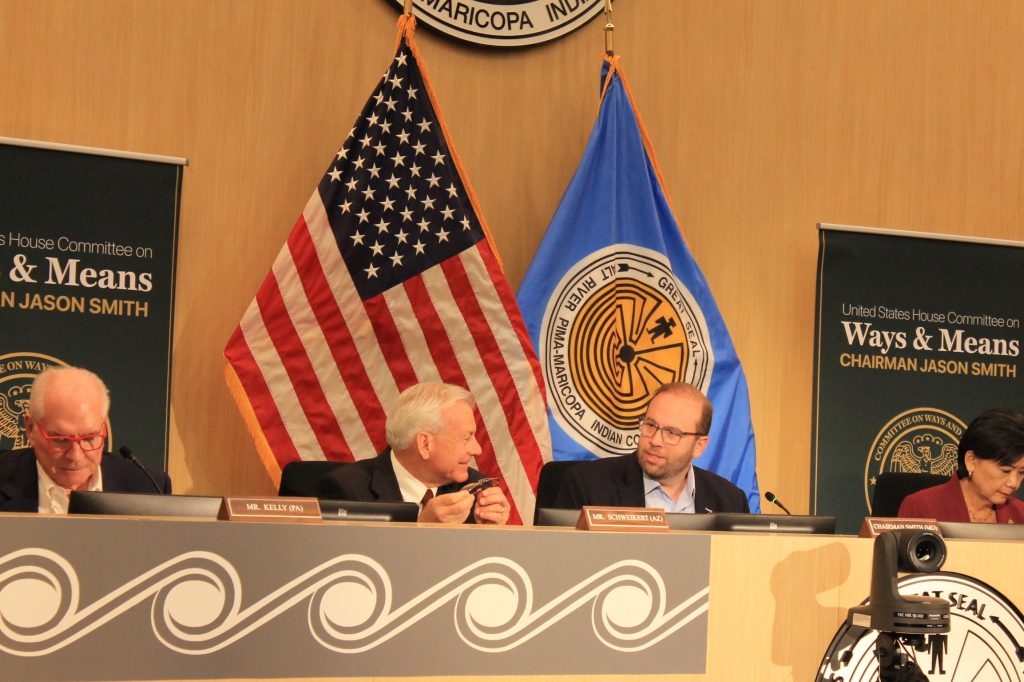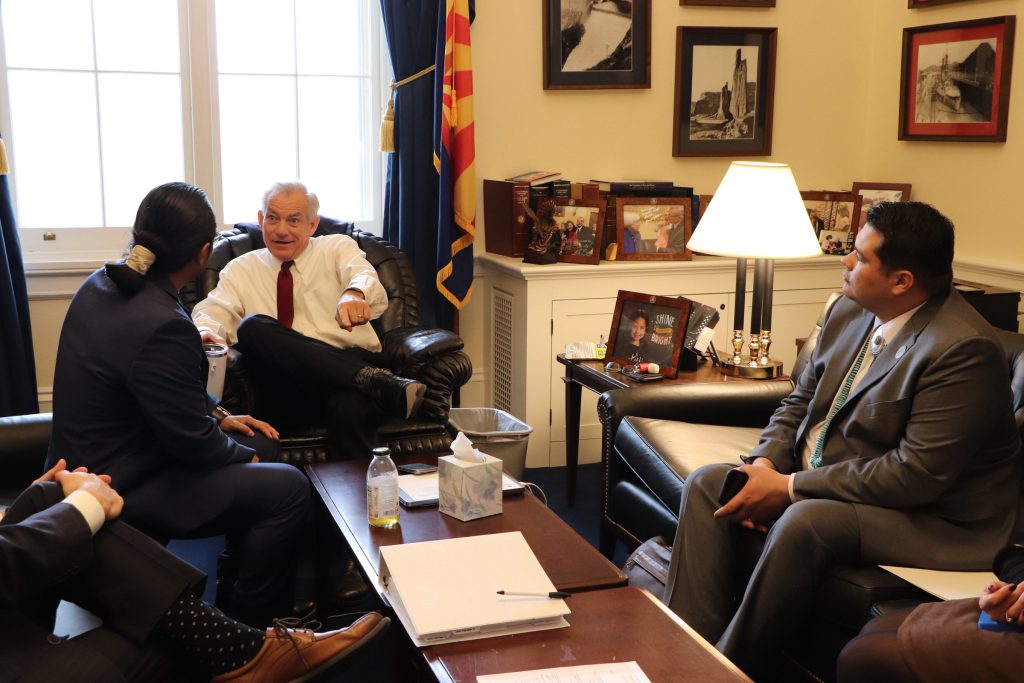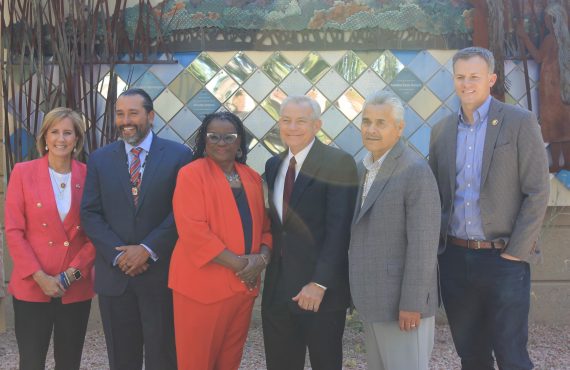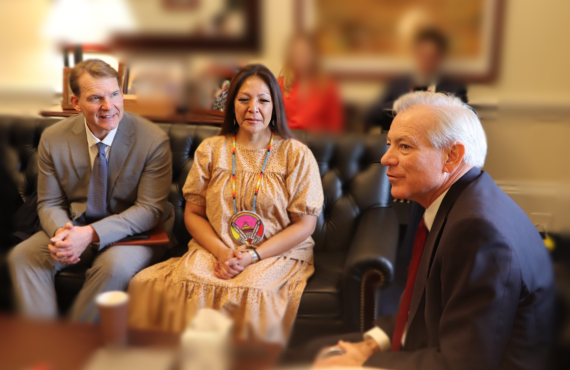WASHINGTON, D.C. – Today, the Arizona Congressional Delegation reintroduced bipartisan, bicameral legislation to ratify the historic Northeastern Arizona Indian Water…
I have lived most of my life alongside tribal communities here in Arizona. Arizona’s history is intertwined with those of Arizona’s tribes, and in our state we are fortunate to live side-by-side with 22 federally recognized tribal nations. I cochaired the Indian Affairs Committee years ago while serving as the Majority Whip in the Arizona state legislature, where I learned of the many issues tribes face on a daily basis. Issues between federal and tribal jurisdictions are complex, and Congress must work to fix any discretions. We must make sure our tribes are provided with the funding and resources they both need and deserve.
In fact, during this 118th Congress, I was honored to host a Ways & Means field hearing on Arizona’s very own Salt River Pima-Maricopa Indian Community regarding oncerns of Native American communities and reaffirmed a commitment to help Tribal and rural communities prosper. The hearing marked the first time the Committee has held a hearing on Tribal lands in its 235-year history.
The hearing focused on the challenges faced by Tribal communities when caring for abused and neglected children in the child welfare system. Several witnesses provided firsthand accounts of their experiences working with at-risk children and families, as well as navigating the intricacies of the provisions of the Indian Child Welfare Act. Witnesses detailed how taking care of foster children or adopting Native American children is made more difficult under existing policies. The hearing also directed attention to addressing the shortage of doctors and other medical personnel in both Tribal and rural communities and how Congress can better leverage the tax code to support critical medical research and development.
Native American children in the child welfare system encounter significant obstacles in maintaining connections to their cultural heritage. The preservation of Native American culture while improving collaboration with state agencies was a top priority for witnesses. As the hearing’s host and an adoption policy champion, I inquired a Tribal leader for the Salt River Pima-Maricopa Indian Community what efforts Tribes make to preserve their culture even among Native children adopted by non-Native families. I am a strong proponent of ensuring that the relationship to a child’s native culture.
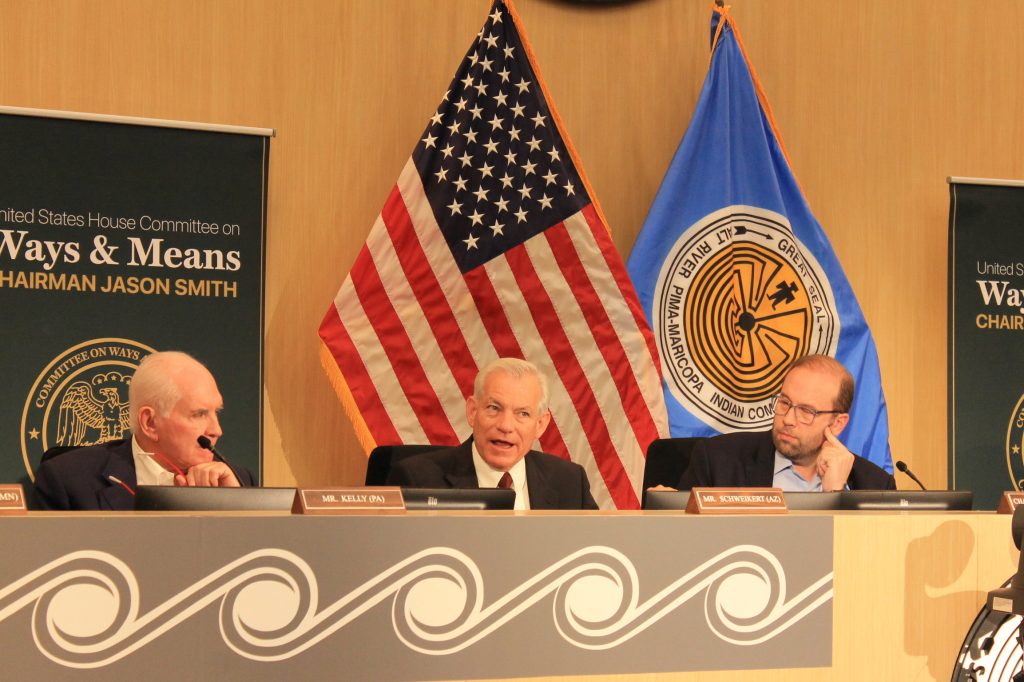
I will continue to work on behalf of the tribal communities here in our state of Arizona, to ensure they receive the opportunities of resources, development prospects, and other funding that have been both promised to them and continue to use my voice on their behalf.
H.R.8949, To approve the settlement of water rights claims of the Yavapai-Apache Nation in the State of Arizona, to authorize construction of a water project relating to those water rights claims, and for other purposes.
H.R.8940, the Northeastern Arizona Indian Water Rights Settlement Act of 2024
The settlement will provide reliable and safe water for these communities, allowing the Navajo Nation and the Hopi Tribe to lease their water, creating economic opportunities until local demand is met through new infrastructure. The settlement authorizes $5 billion to acquire, build, and maintain essential water development and delivery projects, including a $1.75 billion distribution pipeline. In total, the Tribes would be guaranteed access to over 56,000 acre-feet of Colorado River water, and specific ground water rights and protections. Additionally, this legislation will establish a homeland for the San Juan Southern Paiute Tribe.
I am proud to introduce this legislation in continued strong support of the Navajo Nation, the Hopi Tribe, and the San Juan Southern Paiute Tribe. This long overdue investment will not only allow these communities crucial access to clean and reliable water but will ensure their prosperity and opportunities in housing, healthcare, education, and more for generations to come.
H.R.8318, the Tribal Tax and Investment Reform Act of 2024
H.R.8261, the Preserving Telehealth, Hospital, and Ambulance Access Act
Telehealth access was expanded for Medicare beneficiaries during the COVID-19 pandemic to protect vulnerable seniors, providing them greater flexibility to meet with providers without risk of exposure at health care facilities. In 2022, Congress extended these key services through the end of 2024. This legislation ensures that patients can continue to get the care they need through telehealth without any lapse in coverage. “Embracing telehealth is one of the most moral actions we can take to expand patient access to health care providers, which will in turn make our brothers and sisters healthier while reducing overall costs,” said Rep. Schweikert. “This bipartisan bill ensures that patients can continue to meet virtually with their providers and receive the quality care they deserve to make informed decisions about their health. I’m pleased to see the Ways and Means Committee pass this legislation, and I look forward to working with Rep. Thompson to pass this bill through the House.”
“For patients with limited broadband access or those living in remote and rural areas, telehealth technologies have proven to be a critical lifeline for patients seeking quality and reliable care,” said Ways and Means Committee Chairman Jason Smith (MO-08). “Rep. Schweikert’s bill, the Preserving Telehealth, Hospital, and Ambulance Access Act, will help leverage these technologies to deliver better access to care for Americans at home, as well as ensuring rural hospitals and ambulance services are better funded so that rural communities can maintain access to these critical services.”
H.R.7906, the Strengthening State and Tribal Child Support Enforcement Act
The Child Support Enforcement (CSE) program is a federal-state partnership dedicated to obtaining child support on behalf of custodial parents. This vital support system serves 13 million families and 18 percent of all children in the U.S.
As one of the most cost-effective federal programs, in fiscal year (FY) 2023, for every $1 spent on program operations, nearly $5 was collected for families. The program collected nearly $30 billion in payments from non-custodial parents.
Conflicting federal laws threatens the ability of states and tribes to efficiently run their CSE programs using contractors.
Starting on October 1, 2024, the IRS will require states to discontinue use of contractors. This could result in hundreds of millions of dollars in costs to states and the federal government, and suspend child support payments to millions of families, including tribes.
The bipartisan bill formally authorizes state use of contractors for purposes of child support enforcement and gives tribes the same access to information needed to operate their child support enforcement programs.
The Congressional Budget Office estimates this bill would save $777 million.
H.R.3461, the Strengthening Tribal Families Act of 2023
This bill establishes requirements related to state compliance with the Indian Child Welfare Act of 1978 (ICWA). The ICWA establishes minimum federal standards for the removal of Indian children from their families and the placement of these children in foster or adoptive homes.
Specifically, the bill requires a state plan for child welfare services and a state plan related to the Promoting Safe and Stable Families Program to ensure that the agency administering or supervising the plan (e.g., a child welfare agency) shall comply with all federal standards established under the ICWA.
Further, the Department of Health and Human Services (HHS) and the Department of the Interior must, in consultation with Indian tribal organizations and states, develop a memorandum of understanding that specifies the factors for measuring compliance with the ICWA. These factors must include requirements sufficient to assess state strengths and areas for improvement in implementing the ICWA (e.g., timely tribal notice of state child custody proceedings).
Additionally, the bill directs HHS to submit biennial reports to Congress on certain reviews of child and family service programs.
H.R.2461, the San Juan Southern Paiute Tribal Homelands Act of 2023
This bill approves, ratifies, and confirms a specified treaty entered into by the Navajo Nation and the San Juan Southern Paiute Tribe, thus settling land claims and other disputes. (The San Juan Southern Paiute Tribe is a federally recognized tribe occupying lands within the Navajo Indian Reservation. In 2000, the tribes entered into a treaty to set aside lands for the exclusive use of the San Juan Southern Paiute Tribe and to address other matters. This treaty requires ratification and approval by Congress.)
The bill directs the Department of the Interior to approve, execute, and implement the treaty. Further, the bill delegates authority to Interior to approve amendments to the treaty without further action by Congress.
Additionally, the bill proclaims approximately 5,400 acres of land within the Navajo Indian Reservation (described in the treaty as the San Juan Paiute Northern Area and the San Juan Paiute Southern Area) as the San Juan Southern Paiute Reservation. These lands shall be held in trust as a reservation for the exclusive benefit of the San Juan Southern Paiute Tribe. Interior must survey, mark, and fence lands to establish the boundaries of the reservation.
The transfer of these lands shall also include the transfer of associated water rights, which shall be held in trust for the benefit of the tribe. The bill also outlines water rights associated with the San Juan Paiute Northern Area and the San Juan Paiute Southern Area.
H.R.4881, the Old Pascua Community Land Acquisition Act
This act directs the Department of the Interior to take tribally owned lands in Pima County, Arizona, into trust for the benefit of the Pascua Yaqui Tribe of Arizona. Lands taken into trust shall be part of the Pascua Yaqui Reservation.
The act allows gaming on the land taken into trust.
H.R.4054, the Tribal Tax and Investment Reform Act of 2021
This bill treats Indian tribal governments as states for purposes of the annual allocation of the tax-exempt bond volume cap. It also repeals provisions that limit an Indian tribal government’s eligibility to issue tax-exempt bonds or to be exempt from specified excise taxes to transactions involving the exercise of an essential government function customarily performed by state and local governments.
The bill (1) treats employee benefit or pension plans maintained by Indian tribes and domestic relations orders issued pursuant to tribal law in the same manner as plans maintained by states and domestic relations orders issued pursuant to state law; and (2) treats tribal charities and foundations in the same manner as charities and foundations funded and controlled by other governmental entities for purposes of the tax-exempt status of, and deduction for contributions to, such organizations.
The bill gives Indian tribes or tribal organizations access to the Federal Parent Locator Service if they are eligible for a grant to operate a child support enforcement program. It makes those tribes and tribal organizations eligible to participate in the program that collects past-due support from individual tax refunds.
An Indian tribal government may determine whether a child has special needs for the purpose of the tax credit for the adoption of a child with special needs.
H.Res.173, the Expressing support for designation of the week beginning February 28, 2021, as “National Tribal Colleges and Universities Week”.
H.R.5546, the Native American Health Savings Improvement Act
To amend the Internal Revenue Code of 1986 to permit individuals eligible for Indian Health Service assistance to qualify for health savings accounts. An individual shall not be treated as covered under a health plan described in such subparagraph merely because the individual receives hospital care or medical services under a medical care program of the Indian Health Service or of a tribal organization.”.
The Protecting America’s Children by Strengthening Families Act (H.R. 9076)
The last time these programs were authorized was fiscal year 2021 and the program last received significant reforms in 2008.
The legislation includes 16 bills from a bipartisan coalition of Republican and Democrat members that update and reform the programs.
Reauthorizes Title IV-B for five years and makes reforms to modernize the program.
Reduces paperwork and data reporting for state agencies and caseworkers by at least 15 percent.
Strengthens support systems for the 2.5 million grandparents and relatives providing kinship care for children who would otherwise enter foster care.
Improves access for Indian tribes by streamlining funding, as well as improving state compliance with the Indian Child Welfare Act.
Addresses the caseworker crises by ensuring caseworkers have access to technology and training that support a strong workforce.
Improves outcomes for youth transitioning from foster care, including by allowing foster youth up to age 26 to be eligible for services and incorporating lived experience in the state planning of child welfare plans.
Supports the expansion of evidence-based services to prevent child abuse and neglect and ensures children are not separated from parents solely due to poverty-related neglect.
Supports adoption services by evaluating the effectiveness of pre- and post-adoption services available under Title IV-B to adopt the more than 65,000 children waiting to be adopted.
